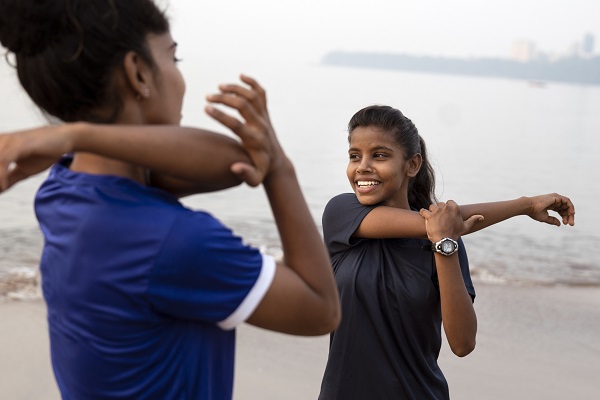-
Whether you’re running a half marathon, playing a game of basketball or just trying to smash your PB at the gym, your mind has an important job to do.
Feeling confident, powerful and ‘in the zone’ can be the boost that pushes you through a physical challenge. On the flipside, anxiety and self-doubt can be your biggest saboteurs.
Sports psychologist Daniel Dymond, director of the Performance and Sports Psychology Clinic, says it’s essential to develop a mindset that allows you to take challenges on, and that is prepared to deal with difficult emotions and physical sensations.
“The ability to shift attention to what matters in the presence of pressure, stress, and opportunity is the most valuable skill an athlete can have,” he says. “And when it comes to your mindset, small changes can make significant differences.”
Grow your mindset
The first thing to understand is that your mindset isn't a fixed state. “I describe it as being more like a garden," Dymond says. "It’s something you cultivate. It’s constantly growing, and sometimes you spend more time tending to one area. Sometimes you need to weed things out, cut them away. Sometimes you need to just let things be and grow in their own time.”
To perform at your best, it’s of course ideal to be calm, clear and focused on the task at hand. But sometimes the pressure of telling yourself to feel a certain way – trying to banish anxiety, nerves and self-doubt – can just make it worse.
Dymond suggests a more helpful approach is to cultivate acceptance, willingness and flexibility. “You need to be flexible with whatever might come up for you emotionally, or whatever thoughts your mind may bring up during the pressures and stresses of competition,” he says.
“Sports performance and competition are uncertain, so if your mindset is rigid, it can impact your performance in so many ways.”
Let discomfort in
Learning to sit with discomfort is easier said than done. This is where mindfulness can be a really powerful tool. There is plenty of research supporting the benefits of mindfulness for soothing stress and boosting your focus, clarity and resilience. For sports psychology, this can be a game-changer.
“Sometimes when difficult experiences come up, we fight with them, avoid them, wrestle for control,” Dymond says. “A skill to learn is to be able to sit with those experiences, and then place your attention back onto what really matters.”
The idea is to change your relationship with difficult emotions, so that you can work with them instead of being overwhelmed by them. This means practising what Dymond calls the three O’s of mindfulness – openness, objectivity and observation.
When you’re halfway through a lap of the pool and thoughts like “I can’t do this” or “This is too hard” barrel their way into your mind, simply let them in. Observe them for what they are – just thoughts, nothing more. By learning to sit with them mindfully and non-judgmentally, you can take away some of their power.
“Your mind will bring up stories about how difficult it is, asking you to focus on the struggle,” Dymond says. “But just because the phone rings, it doesn’t mean you have to answer it.
“Once you understand a bit more about yourself and how your mind may operate in those moments – what fears and worries tend to come up for you – just acknowledge that it’s your mind bringing up an old story.”
Practising mindfulness
Meditation is an excellent way to develop mindfulness skills, but it’s definitely not the only way. You can practise mindfulness while you’re walking down the street, or playing with your dog, or enjoying a nourishing breakfast. All you need to do is focus on what you’re experiencing with all your senses, let your thoughts come and go, and keep gently bringing your attention back to the present moment.
“You can do mindfulness with a cup of coffee,” Dymond suggests. “Use your five senses. Notice the temperature of the cup, the taste, the smell, the texture. Notice the whole experience of the coffee going down your throat and disappearing into your stomach.”
Keep practising these fundamentals so you can apply them when you need to – on and off the sports field. “The whole point of mindfulness is to apply it to your life. Bring this attitude to your life and your sports. When you’re in a moment where you know you might start to feel some discomfort, use your mindfulness skills so that your mind doesn’t push you around.”
How to get in the sports performance zone

-
Stretches for gym enthusiasts
8 stretches to help you cool down from workouts
-
Stretches for office workers
Stretch out your back and relieve stress
-
Stretches for runners
Stretch your legs, hips and back after a long run
-
How to walk 10,000 steps
Discover how to easily reach your goal of 10,000 steps daily.
-
Everything you need to know about parkrun
Been wondering what a parkrun looks like? Where do you go? What do you do? How do you sign up? Find out here.
-
Five ways to exercise when on a budget
You don’t need to spend money on gym memberships just to meet your fitness goals. Here are five free ways to stay healthy and active when you’re living on a budget.
Subscribe to receive the best from Live Better every week. Healthy recipes, exercise tips and activities, offers and promotions – everything to help you eat, move and feel better.
By clicking sign up I understand and agree to Medibank's privacy policy






